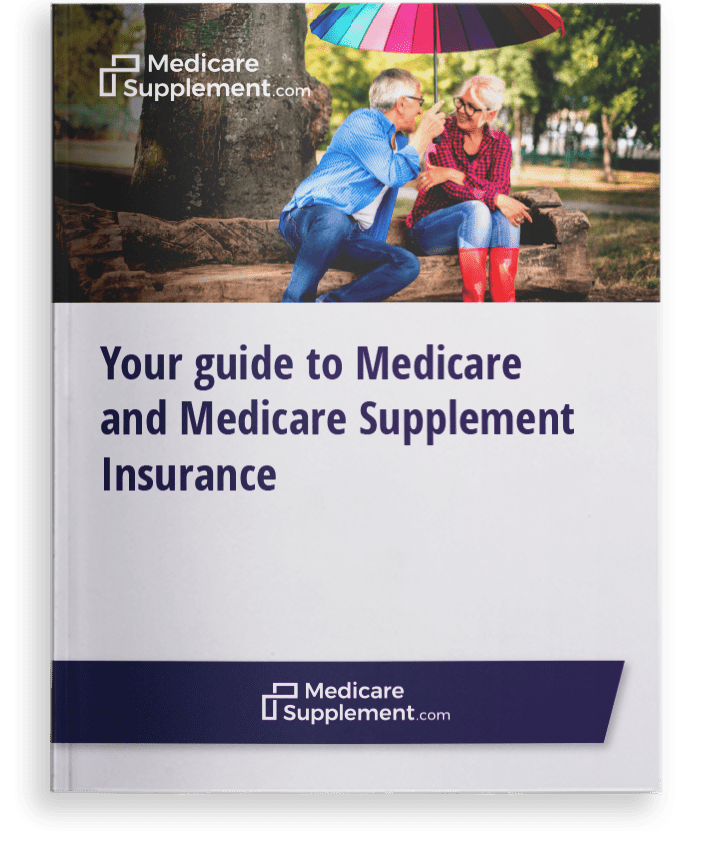Medicare 101
8 Frequently Asked Questions About Medicare Supplement Insurance
Medicare Supplement Insurance (also called Medigap) is an optional type of insurance that can be used in combination with Original Medicare (Parts A and B). A Medicare Supplement Insurance plan helps pay for out-of-pocket expenses that are associated with Original Medicare, such as deductibles, coinsurance and copayments, as well as other costs.
Below are some frequently asked questions related to Medicare Supplement Insurance.
1. What does Medicare Supplement Insurance cover?
Each Medicare Supplement Insurance plan provides either full, partial or no coverage for each of the following nine basic benefit areas:
- Medicare Part A coinsurance and hospital costs
- Medicare Part B copayments and coinsurance
- The first three pints of blood needed for a transfusion
- Medicare Part A hospice care copayments and coinsurance
- Medicare Part A coinsurance for skilled nursing care facility
- Medicare Part A deductible
- Medicare Part B deductible
- Medicare Part B excess charges
- Foreign travel emergency care
Each of the 10 types of Medigap plans are standardized across the country in terms of coverage. In other words, a plan type sold by a company in one area of the country must offer the exact same combination of benefits as the same plan type sold by a different company in another part of the country.
*Coverage for Medicare Supplement Insurance is standardized differently in Minnesota, Wisconsin and Massachusetts.
2. How much does a Medigap plan cost?
Medicare Supplement Insurance is sold on the private marketplace, so each insurance company is free to set their own prices for any given plan. The cost of a plan can vary greatly based on a few factors.
- Plan prices can differ based on location. For example, the price of a plan in New York may be quite different than the cost of the very same plan sold in California, even though they offer the exact same basic benefits.
- In addition to setting their own prices, insurance companies are also free to offer any discounts that they wish. Discounts are often offered for things like being a nonsmoker, being married or paying your premium on an annual instead of monthly basis.
- Insurance companies may use different pricing models to determine your rates. You may pay a little more if you first enroll in a plan when you’re older. It is also possible that the cost of your plan will go up as you age.
You may have to pay more for a plan if the insurance company is allowed to use medical underwriting to determine the cost of your plan.
3. How do I know if I am eligible for Medicare Supplement Insurance?
In order to be eligible for a Medicare Supplement Insurance plan, you must meet each of the following requirements:
- You must be enrolled in both Part A and Part B of Medicare
- You must be at least 65 years old or live in a state that allows Medigap coverage for people under 65 who have end-stage renal disease or a qualifying disability*
- You must live in a state that sells the plan you are interested in purchasing. Not all plans are available in every state
*The states that are required to offer Medigap plans for people under the age of 65 include: CA, CO, CT, DE, FL, GA, HI, IL, LA, ME, MD, MA, MI, MN, MS, MO, NH, NJ, NY, NC, OK, OR, PA, SD, TN, TX, OK, VT, WI.
4. When can I enroll?
The best time to enroll in Medigap is during your Medigap open enrollment period. This is a six-month period that begins the month that you are enrolled in Medicare Part B and are at least 65 years old (or qualify because of a disability or end-stage renal disease).
During your open enrollment period, insurance companies are not allowed to use medical underwriting when considering your application. You may also switch Medigap plans during this time if you aren't satisfied with the one you initially selected.
However, if you enroll in a plan outside of your open enrollment period, insurance companies may be allowed to base the cost of your plan on your current and past health. This could lead to a higher premium. And if a company determines your health is too poor, they may deny you coverage entirely (which they are not allowed to do if you enroll during your open enrollment period).
5. Will I be able to keep my doctor?
Any physician or facility that accepts Medicare also accepts Medicare Supplement Insurance. So as long as your provider accepts Medicare, your Medigap plan will also be accepted.
6. What if I move to a new state or spend part of the year in another location?
If you move to a new state or have a seasonal retreat, your Medigap plan will usually travel with you, even if that plan is not sold in the other state. It’s best to check with your insurance agent to make sure your Medigap coverage will travel with you wherever you go.
7. Can I use a Medicare Supplement Insurance plan with a Medicare Advantage plan?
A Medicare Supplement Insurance plan may only be used in conjunction with Original Medicare (Part A and Part B). If you are enrolled in a Medicare Advantage plan and enroll in a Medicare Supplement Insurance plan, you will need to leave your Medicare Advantage plan before your Medigap plan takes effect.
8. How do I enroll in a Medigap plan?
Contact a licensed agent. Because the prices and availability of plans can differ from one insurance company to another, the best way to shop for a plan is to compare offerings from multiple insurance companies in your area. The best way to do this is to have an agent provide you with a range of plan options and price quotes once you are age-eligible.
Speak to an agent today at 1-800-995-4219 to compare your Medigap plan options.

Get a Free Medicare Guide!
Enter your email address and get a free guide to Medicare and Medicare Supplement Insurance, as well as important Medicare news and tips. We promise to never send you spam – just helpful content!
By clicking "Get your guide" you are agreeing to receive emails from MedicareSupplement.com.

